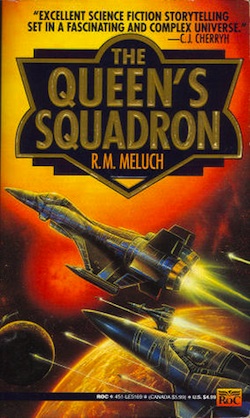Sometimes I wonder how many science fiction novels feature torturers with homosexual tendencies. I have a feeling the final tally would disturb me. (No, don’t tell me. I don’t need to know.)
R.M. Meluch’s The Queen’s Squadron (Roc, 1992) is among them. Fortunately, it’s not a clichéd portrayal: The Queen’s Squadron is an odd and, yes, ambitious (albeit in strange ways) wee book. I’m still not entirely sure what to think of it, although I am noticing—I can’t call it a trend; pattern is perhaps the better word—a pattern in Meluch’s work, an undercurrent deeply influenced by the Classical world. Or at least delighted to salt in off-the-cuff references and throwaway names.
Take The Queen’s Squadron. Some indeterminate time in the future, three nations share one world (not Earth, although Earth is mentioned) and skirmish in space: one, ruled by immortals who apparently also come from Earth, has something of an empire. One is neutral. And one is the nation of Telegonia, the “free mortals,” who’ve been clashing on and off with the immortals’ empire for quite some time. FTL space travel is only possible by means of “gates,” with the exception of the c-ships of the Queen’s Squadron, crewed by the elite fighter-pilots of the immortals’ empire.
Immortals don’t risk their lives. But one has. Maya of the Timberlines, formerly known as Ashata, chooses to join the Queen’s Squadron under an assumed identity. Meanwhile, Telegonia has come up with a plan to cripple the immortals’ empire for good. Gotterdammerung. War is coming. No, wait. It’s already there.
The novel follows three strands. The story of Major Paul Strand, who knows the plan for Gotterdammerung and falls into enemy hands, surviving torture and Stockholm syndrome to return home. The story of Penetanguishene, last survivor of a race of people who know infallibly when someone is lying: first Paul’s torturer, and afterwards a species of friend. And the story of Maya, as she learns to understand her comrades, and comes to fall in unwilling love with the Squadron’s commanding officer, Race Rachelson. As the story unfolds, and the war progresses towards the collapse of the immortals’ empire, it becomes clear that war—its outbreak, its progress, its conclusion—has been manipulated into being.
Telegonia comes from the Greek Τηλεγ?νεια, and means born far away. It’s also the name of a lost epic from the ancient Greek world, about Telegonus, son of Odysseus and Circe. When Telegonus comes to Ithaca, he goes unrecognised and ends up killing Odysseus by mistake. I’m trying not to read too much into the connection of names in a novel that puts so much of its thematic freight in concealments—of information, of identities, of the person behind the curtain secretly pulling all the strings—but the coincidence, if indeed it is one, adds an interesting layer of resonance to a story whose themes are wrapped around the interplay of truth and power.
It does a couple of things that annoy me, particularly with regard to character, however. Meluch’s characters in general seem to be facile constructions, rarely achieving any great depth. The ratio of female to male characters is skewed male, and it is notable to me that the one women who has point of view and some personality ends up entangled in the orbit of the alpha male in her vicinity. It doesn’t pass the Bechdel test in any meaningful fashion—not that all books have to, but here it seems like a missed opportunity.
It’s an interesting book, with far more meat on its bones—far chewier—than Meluch’s Tour of the Merrimack series books possess. It’s not quite as fun, and I’m not entirely sure whether it’s wholly successful in arguing its themes, but it’s a solid, well-constructed space opera.
It’s not half as problematic as the Tour of the Merrimack either. This novel, I feel certain, doesn’t deserve to be out of print.
Next week, we’ll be taking a look at Jerusalem Fire. And after that, who knows?
Liz Bourke is buried under a mountain of books. One day she might re-emerge. Find her @hawkwing_lb on Twitter.










